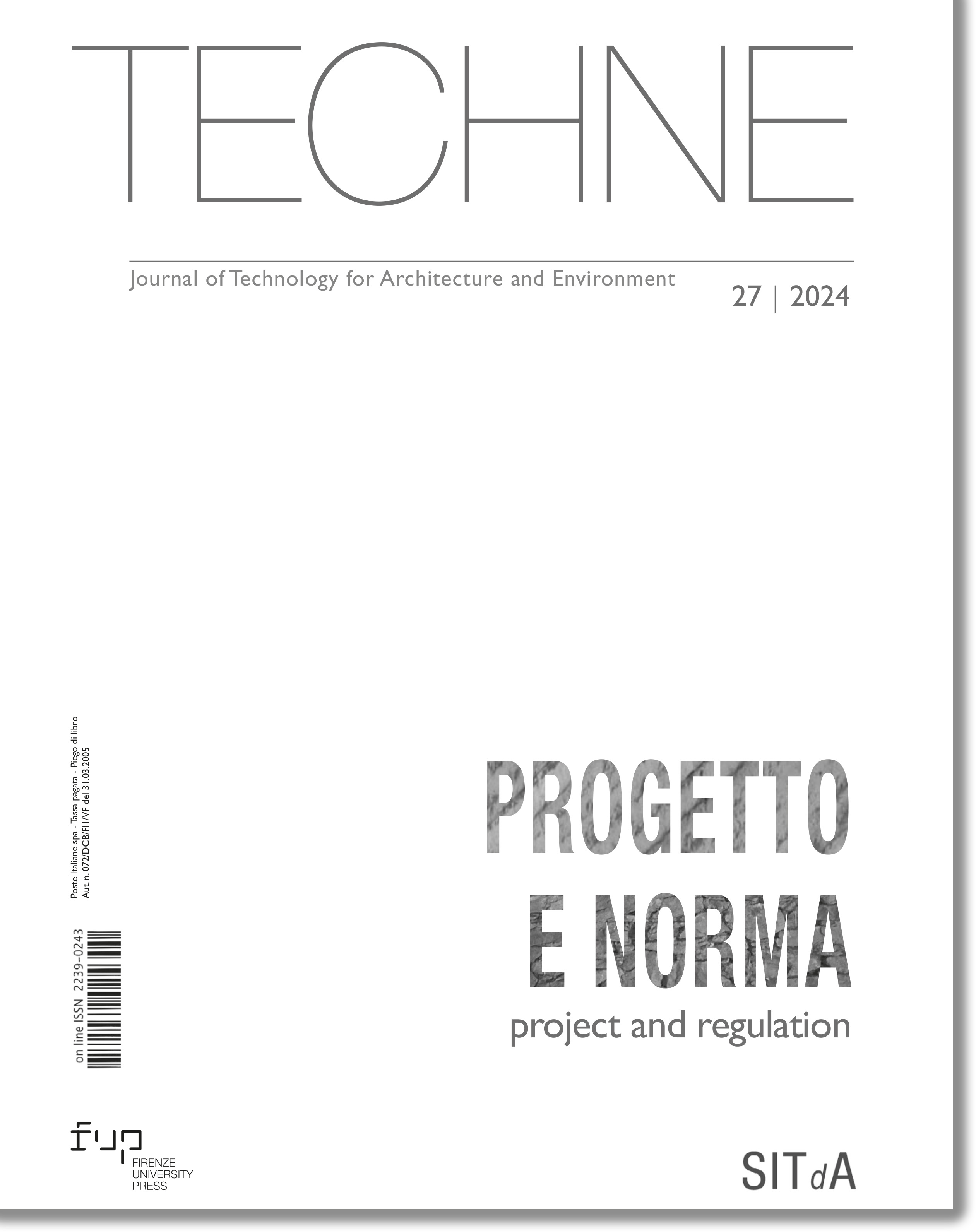Published 2024-06-10
Keywords
- Project quality,
- Quality of works,
- Environmental standards,
- Certification protocols,
- Indicators
How to Cite
Copyright (c) 2024 Andrea Tartaglia, Massimo Babudri, Filippo Salucci, Riccardo Pacini, Annamaria Sereni

This work is licensed under a Creative Commons Attribution 4.0 International License.
Abstract
Public administrations, called upon to integrate the principles and criteria of Do No Significant Harm (DNSH) and Environmental Socia, Governance (ESG) in the planning, design and production of their investments, now find themselves operating within new decision-making scenerios and models, in the very broad framework of standards, including specialised ones, certification protocols and framework levels for sustainability assessment and reporting. This paper reports on a research experience aimed at defining tools and guidelines to incentivise and assess the environmental and social quality of projects and works (a collaboration between Agenzia del Demanio and Politecnico di Milano). It documents the challenges, limits and opportunities arising from overlapping compulsory regulations, standards and voluntary certification protocols for the qualification of public works.
Downloads
References
- AA.VV. (2022), Linee guida per la qualità ambientale e sociale degli interventi, Agenzia del Demanio, versione dicembre 2022, documento interno.
- Antonini E., Tucci F. (a cura di) (201/), Architettura, citta e territorio verso la green economy, Edizioni Ambiente.
- Asdrubali, F., Bisegna, F., De Santoli, L., Evangelisti, L., Guattari, C., Mattoni, B., Rizzo, G. (2018), Verso un linguaggio di sostenibilità condiviso: analisi critica dei protocolli di certificazione ambientale degli edifici, AICARR JOURNAL, Vol. 52, pp. 34-37.
- Attaianese, E. and Acierno, A. (2017), “La progettazione ambientale per l’inclusione sociale: il ruolo dei protocolli di certificazione ambientale”, TECHNE Journal of Technology for Architecture & Environment, Vol. 14, pp. 76-87.
- Bassi, A., Ottone, C., and Dell’Ovo, M. (2019), “I Criteri Ambientali Minimi nel progetto di architettura. Trade-off tra sostenibilità ambientale, economica e sociale”, Valori e Valutazioni, Vol. 22.
- Battisti A. (2023), “Urban Regeneration between Well-Being, Social Determinants and Sustainable Development Goals”, in Battisti A., Marceca M,, Ricotta G., Iorio S. (Eds.) Equity in Health and Health Promotion in Urban Areas: Multidisciplinary Interventions at International and National Level, Springer International Publishing, pp. 3-11. DOI: https://doi.org/10.1007/978-3-031-16182-7_1
- Criteri Ambientali Minimi CAM (2022), Criteri Ambientali Minimi per l’affidamento del Servizio di Progettazione ed Esecuzione dei Lavori di Interventi Edilizi.
- D’Ambrosio V., Rigillo M. and Tersigni E. (Eds.) (2020), Transizioni. Conoscenza e progetto climate proof, Clean, Napoli.
- Dodd, N., Cordella, M., Traverso, M. and Donatello, S. (2017), Level(s) – A common EU framework of core sustainability indicators for office and residential buildings: Parts 1 and 2, EUR 28899 EN, Publications Office of the European Union, Luxembour.
- EU Commission (2003), COM 400 Politica integrata dei prodotti: Sviluppare il concetto di “ciclo di vita ambientale”, Bruxells.
- Ferrante T. and Tucci F. (Eds.) (2022), BASES Benessere ambiente sostenibilità energia salute. Programmare e progettare nella transizione, Franco Angeli.
- Li, T.T., Wang, K., Sueyoshi, T., Wang, D.D. (2021), “ESG: Research Progress and Future Prospects”, Sustainability, Vol. 13. DOI: https://doi.org/10.3390/su132111663
- Losasso M., Lucarelli M.T., Rigillo M. and Valente R. (Eds.) (2020), Adattarsi al clima che cambia. Innovare la conoscenza per il progetto ambientale / Adapting to the Changing Climate. Knowledge Innovation for Environmental Design, Maggioli Editore, Milano.
- Mattoni, B., Guattari, C., Evangelisti, L., Bisegna, F., Gori, P. and Asdrubali, F. (2018), “Critical review and methodological approach to evaluate the differences among international green building rating tools”, Renewable and Sustainable Energy Reviews, 82, 950-960. DOI: https://doi.org/10.1016/j.rser.2017.09.105
- Roderick, Y., McEwan, D., Wheatley, C. and Alonso, C. (2009), Comparison of energy performance assessment between LEED, BREEAM and Green Star.
- Tartaglia, A. (2018), Progetto e Nuovo Codice dei contratti, Maggioli Editore, Santarcangelo di Romagna.






